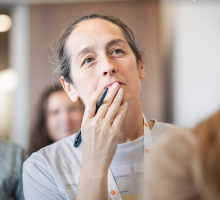Speakers
Confirmed speakers are listed below. The full line-up and schedule for the day will be published in next few days.
Confirmed speakers are listed below. The full line-up and schedule for the day will be published in next few days.

Web Development Team Manager in University of Edinburgh
7 years ago we started thinking about a new web landscape and the daunting thought of migrating 600 websites from our Drupal 7 monolith to a new ecosystem with more flexibility, less code and enable growth in our developer community.
We wanted to fully adopt the Drupal model…less code, more functionality, less barriers, more features and modernize content management across the university. Offer something a service that surpassed what schools across the university would have no choice but to buy into and change the way we do websites at The University of Edinburgh.
My presentation will cover our journey from conception, to building, migration and the future.

Front-end developer and certified web accessibility specialist, support-worker, project manager, covert designer – Maria has fingers in all the pies. She loves working and making friends with our clients, and knows most of their sites inside out.
When the European Accessibility Act (EAA) comes into force in March 2025 private and public organisations providing products and services to anyone in the EU, including digital services and websites, will be required to meet specific accessibility standards to ensure equal access for people with disabilities.
However, accessibility is more than compliance, it is the backbone of modern user experience design. In this session, we'll explore how Drupal can help site builders and front-end developers not only meet but exceed accessibility standards like WCAG 2.2 and the EEA.
This session will dive into Drupal’s core accessibility tools, advanced theming techniques, and content workflows to ensure your site is accessible by design. We'll also share best practices for building custom components and enhancing the user experience for people of all abilities.
Join us to learn how you can leverage Drupal to go beyond compliance and create websites that truly empower every user.

User Experience Team Manager in University of Edinburgh
We want Drupal to be inclusive and accessible to everyone, and that starts with the words we use. The 'Drupalisms' issue was born from a belief that people shouldn't need to know how to ‘speak Drupal’ to be able to use it to create outstanding digital user experiences. In this talk, I'll explain how we're addressing this and how you can help us de-mystify Drupal and make it available to all.

Delivery Manager at Drupal Association, Co-organizer at DrupalCampKyiv
This autumn marks 10 years since my first Drupal event and goodness me, does time fly! In a blink of an eye (rather long one, perhaps) instead of a Drupal newbie I find myself working for the Drupal Association and being a part of the core team behind Drupal CMS (aka Starshot).
Let’s get together and talk about weird tricks of time, the community you can’t leave once you get to know it and exciting future of Drupal! (edited)

Community Lead at LocalGov Drupal.
He was a founder member of Agile Collective, working as a project manager and erstwhile Drupal site builder when he could get away with such things. Alongside his LGD work, he also works for Open Food Network UK and is a cooperative business advisor in Scotland. If he’s not at his desk, you will most likely find him up a hill or on a cricket pitch.
Large organisations like councils, governments, universities have always needed to run a varying number of small websites. However, these are often on disparate technologies, maintained by disparate individuals and companies and quickly become inconsistent and out of date.
Let's take the pain of managing a fleet of microsites away and manage them all from one Drupal installation - the LocalGov Drupal Microsites platform.

Co-Founder at 1xINTERNET GmbH
Drupal is striving to be the best AI-Powered Open-Source CMS. Consequently, AI functionality will also be included in the first official version of Drupal CMS (aka Starshot), that will be released in January 2025.
Drupal has a powerful AI module family and AI driven functionality can easily be created. However, finding the right use-cases for AI in custom projects can be quite challenging.
In this session I will first provide a simple introduction to AI and Large Language Models (LLMs) in particular to make sure all attendees have the same level of knowledge.
Then, I will provide an overview of what is possible with AI in Drupal. In particular I will focus on custom applications using Large Language Models (LLMs).
To inspire the attendees, engaging AI demo applications with Drupal will be presented that solve a variety of use cases. One of the use cases will be an assistant that can interact with dynamically fetched content (Retrieval Augmented Generation - RAG).
Lastly, an easy ideation process will be presented that can help discover potential for useful AI applications.

Senior Solutions Architect & Digital Innovation Specialist at 1xINTERNET GmbH
With over 15 years of experience, I’ve had the chance to work on Drupal projects at every scale imaginable—from small teams to sprawling, multi-site setups for large organisations. In this session, I’ll share the practical ins and outs of scaling Drupal, going beyond theory to cover what works (and what to avoid) when managing dozens of sites on a shared code base.
We’ll dive into:
This session is all about sharing real-life lessons—what to prioritise, what to skip, and how to set up your Drupal environment for success in a large organisation.

Phil is a Developer at Code Enigma, and is also the founder and administrator of #! code https://www.hashbangcode.com/. He helps run the North West Drupal User Group.
The Drupal Batch API is a system that allows us to split up large tasks into smaller chunks so that we don't overload the web server. This is a really important concept to understand if you are developing your own Drupal modules, especially if you want to allow users to perform actions on lots of items at once.
In this session we will look at why we need the Drupal Batch API and how it prevents issues. We'll then do a dive into the code surrounding the Batch API and how to run your own batch operations.
There will be a few demos on running the Batch API to perform some simple tasks.
Finally, we'll look at how Drupal uses the Batch API internally and some use cases of the Batch API in contributed modules.